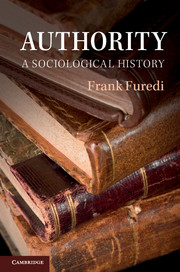Book contents
- Frontmatter
- Contents
- Preface
- Introduction: always in question
- 1 Thersites and the personification of anti-authority
- 2 Socrates and the quest for authority
- 3 Rome and the founding of authority
- 4 Augustus: a role model for authority through the ages
- 5 Medieval authority and the Investiture Contest
- 6 Medieval claim-making and the sociology of tradition
- 7 Reformation and the emergence of the problem of order
- 8 Hobbes and the problem of order
- 9 The rationalisation of authority
- 10 The limits of the authority of the rational
- 11 Taming public opinion and the quest for authority
- 12 Nineteenth-century authority on the defensive
- 13 Authority transformed into sociology's cause
- 14 The rise of negative theories of authority
- 15 By passing authority through the rationalisation of persuasion
- 16 In the shadow of authoritarianism
- Conclusion: final thoughts
- Bibliography
- Index
4 - Augustus: a role model for authority through the ages
Published online by Cambridge University Press: 05 June 2014
- Frontmatter
- Contents
- Preface
- Introduction: always in question
- 1 Thersites and the personification of anti-authority
- 2 Socrates and the quest for authority
- 3 Rome and the founding of authority
- 4 Augustus: a role model for authority through the ages
- 5 Medieval authority and the Investiture Contest
- 6 Medieval claim-making and the sociology of tradition
- 7 Reformation and the emergence of the problem of order
- 8 Hobbes and the problem of order
- 9 The rationalisation of authority
- 10 The limits of the authority of the rational
- 11 Taming public opinion and the quest for authority
- 12 Nineteenth-century authority on the defensive
- 13 Authority transformed into sociology's cause
- 14 The rise of negative theories of authority
- 15 By passing authority through the rationalisation of persuasion
- 16 In the shadow of authoritarianism
- Conclusion: final thoughts
- Bibliography
- Index
Summary
Rome provided the intellectual resources for rendering authority meaningful. It is frequently observed that auctoritas is a ‘uniquely Roman idea’. This does not mean that the Romans discovered authority, but that they self-consciously reflected on it and attempted to conceptualise its different dimensions. In particular, through distinguishing between potestas, the power to command, and auctoritas, the Romans succeeded in representing authority ‘in terms of a procedure of authorization’. Moreover, the Romans turned their political experiences into a durable legacy that others would draw on. As the political philosopher Michael Oakeshott notes,
this political experience generated a legend of itself in which actions and events acquired poetically universal significance – a legend unmatched until quite modern times, in which the Romans expressed their beliefs about themselves as a community and about what they were doing in the world.
Over the past two millennia Rome has served as source of authority for a variety of political rulers, religious leaders, revolutionaries and philosophers. The influence of Rome did not only transcend national boundaries but also the political divide. Conservative thinkers dreaming of a restoration of order were no less drawn towards finding inspiration from the legacy of Rome than were radical revolutionaries aspiring to the building a new world. ‘Law, order, reverence for authority, the whole framework of political and social establishment, are the work of Rome on the lines drawn once for all by the Latin genius’, noted the Scottish socialist and Virgil scholar, John William Mackaill, in his address to the Classical Association in 1904. Similar thoughts were expressed by his more conservative-thinking colleagues, who equated Rome with permanence, stability and order.
To this day, diagnoses of political issues and problems are often mediated through reflections on the experience of Rome. It is as if the appropriation of Roman legend, ideals and symbols is necessary for re-discovering the meaning of authority in very different circumstances, and in line with different historical and cultural sentiments. Those whose focus is the representation or consolidation of authority have frequently turned to Augustus for guidance. It is a testimony to the accomplishment of Augustus that the historical quest for validation and legitimation has time and again sought to clarify its own views and learn from the experience of the Principate.
- Type
- Chapter
- Information
- AuthorityA Sociological History, pp. 70 - 94Publisher: Cambridge University PressPrint publication year: 2013



